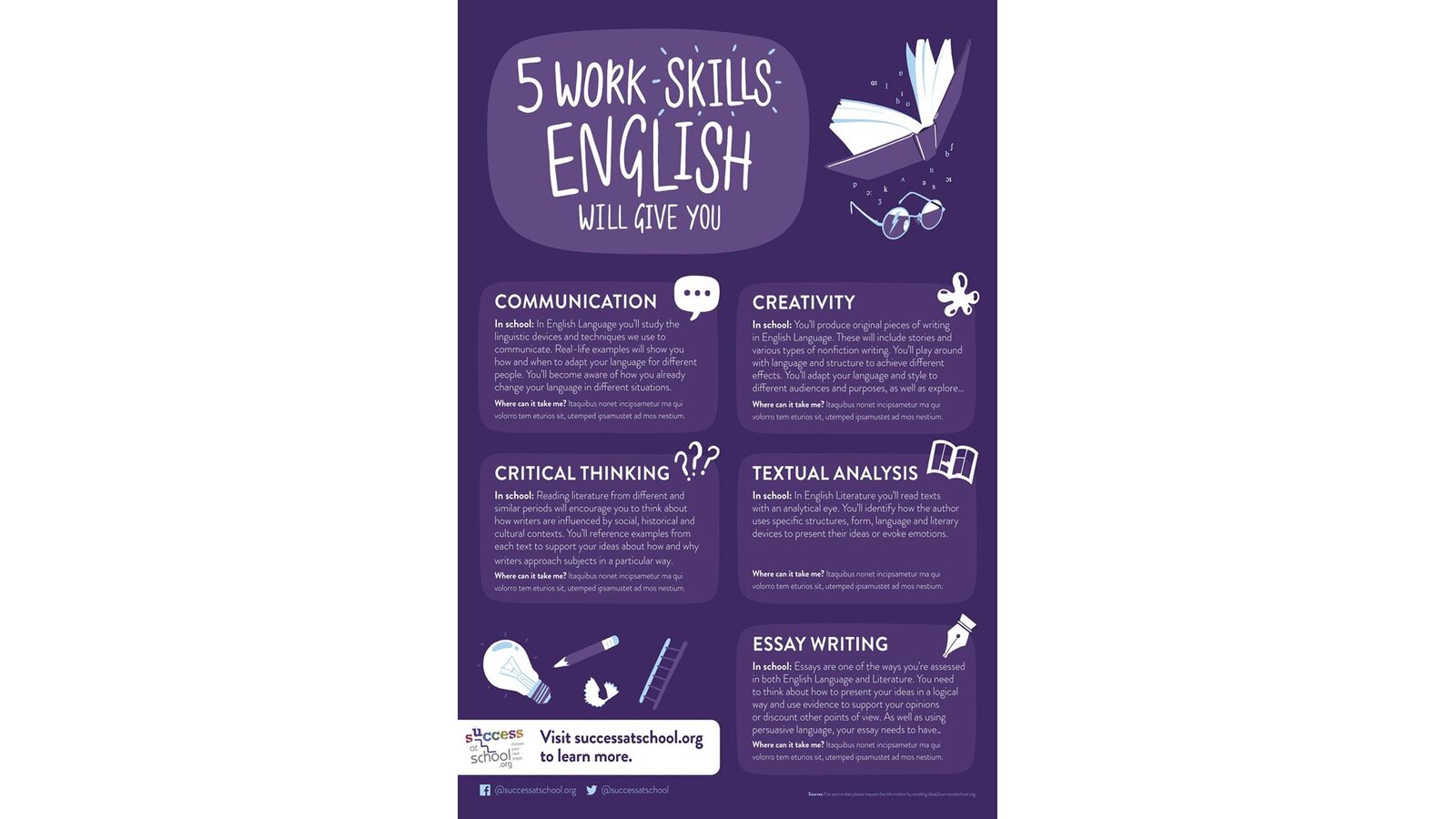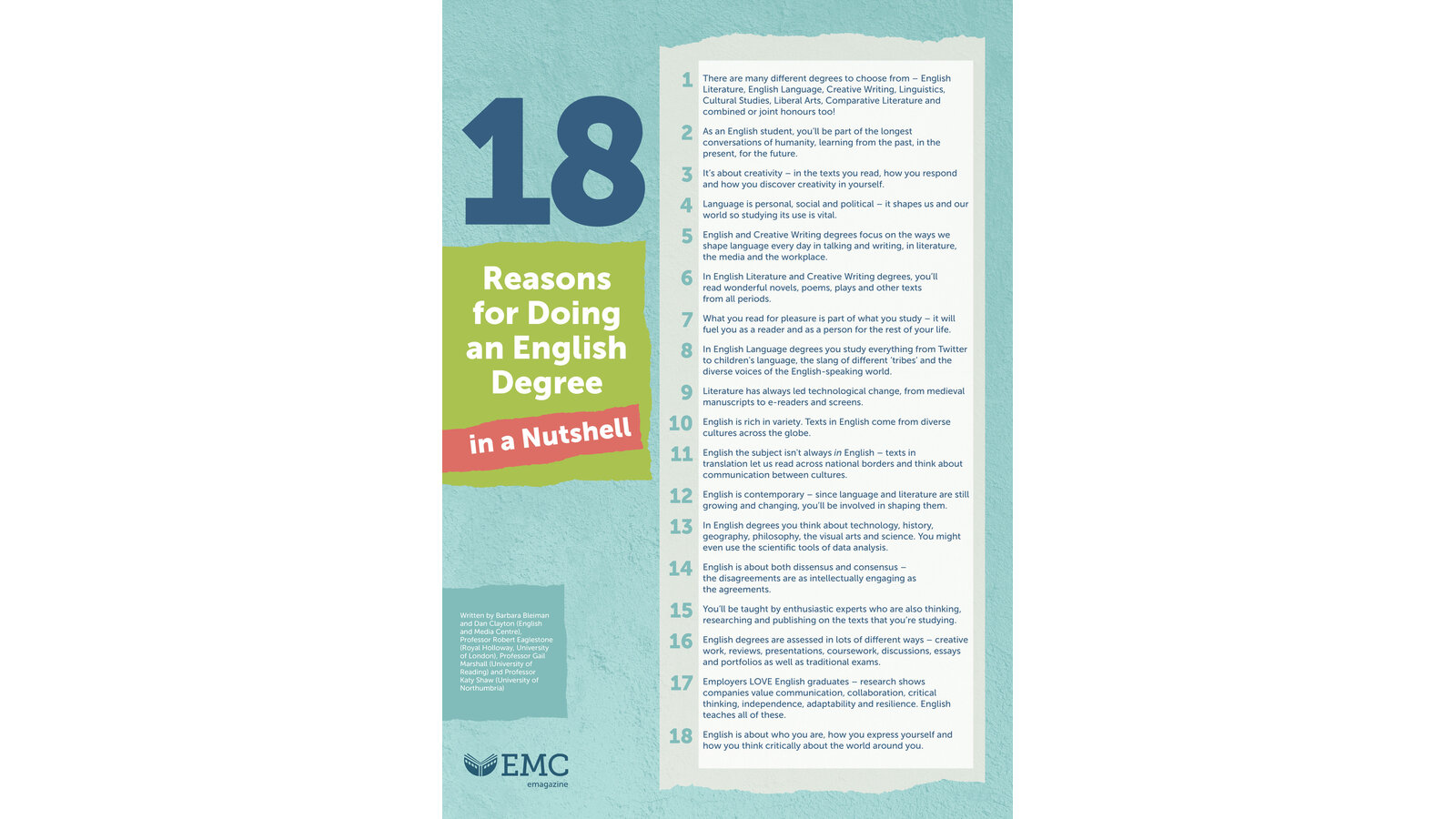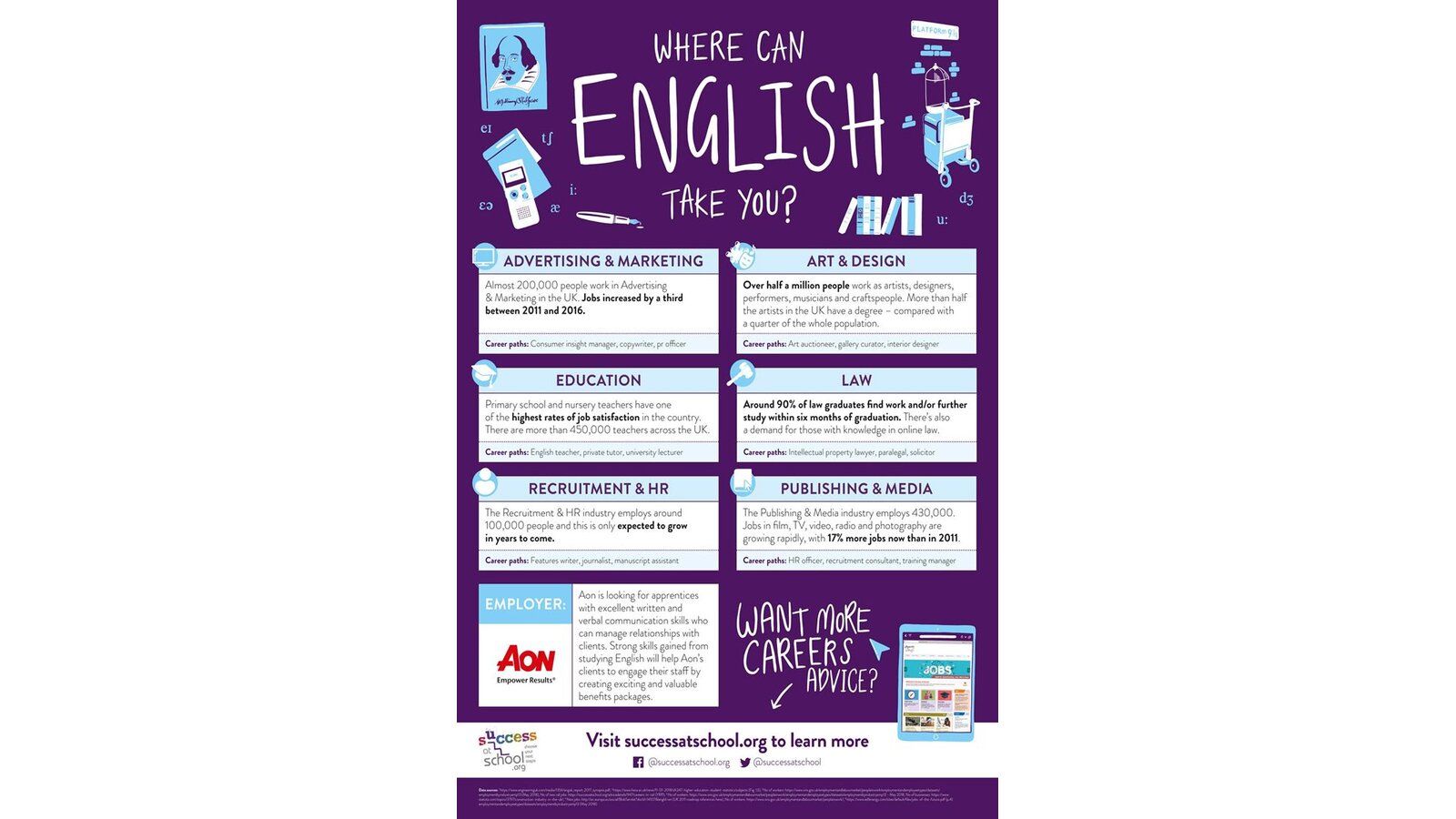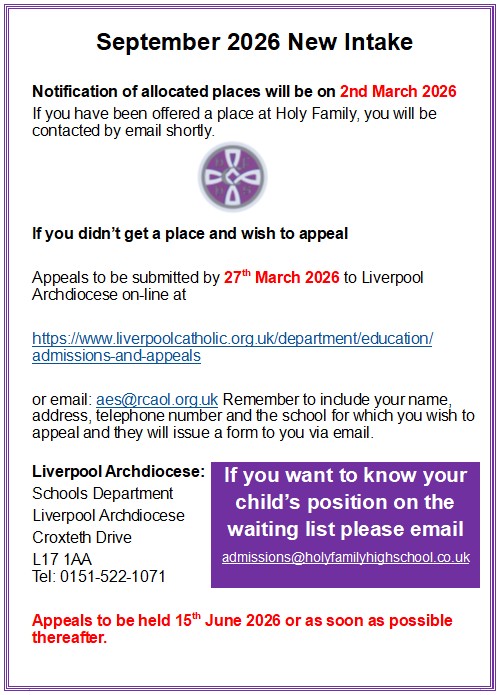English
Head of Department - Mrs H. Tamburro
The study of English is vital in enabling students to understand and communicate ideas, emotions and information. It is a subject that facilitates effective participation in a fast-paced world. Beyond its practical applications, English is central to the development of young people’s social, cultural, intellectual and spiritual development. We are in the privileged position of helping students develop their understanding, empathy and creativity by exploring a range of high-quality texts.
The Key Stage 3 curriculum (years 7-9) is inclusive and ambitious for all students, being both accessible to SEND pupils and providing challenge to the most able pupils. Teaching classes are mixed ability as we believe that all pupils should aspire to excellence and have a mindset focused on success. Pupils study a broad range of exciting, engaging, diverse texts which are thematically linked and sequenced to enable students to communicate confidently, read skilfully and write effectively. These are skills which are vital for pupils’ sense of personal integrity and are essential for our young people as they move beyond education in later years.
At Key Stage 4, our aim is to encourage students to build on the knowledge and skills acquired at Key Stage 3 and to flourish in preparation for the GCSE exams in English Language and English Literature. By studying a broad range of fiction and non-fiction, we aim to support students in the following skills: extending their critical and analytical reading skills; further crafting and refining their writing skills, building stamina and writing for a range of purposes; speaking confidently and articulating their views effectively.
To enhance the experience of English at Holy Family and to increase our pupils’ cultural capital, we provide a range of enrichment activities These include author visits, writer workshops, theatre trips and other literary events.
Key Stage 3
Curriculum Intent
Year 7 – Other Worlds
The thematic focus for Year 7 is Other Worlds with all the texts that we study being set in different time periods or different places, some imaginary, some very real, to expand a pupil’s knowledge of the wider world around them and the possibilities it holds.
Through a range of texts from different time periods we look to develop the reading skills pupils were introduced to during their time in Key Stage 2, allowing pupils to become more comfortable with identifying explicit information within a text and expanding their ability to infer. We further introduce, and build upon a pupil’s knowledge of, the language techniques writers use when creating these wonderful worlds and the characters we find in them.
Furthermore, we use these worlds as inspiration for a pupil’s own writing, developing the ambition of a pupil’s vocabulary and accuracy of their spelling, punctuation and grammar. Additionally, we further develop a pupil’s knowledge of how to successfully match form and purpose of a wider range of different types of texts.
Year 8 – Outsiders
The thematic focus for Year 8 is Outsiders with all the texts that we study focusing on people who, for a variety of reasons, have to live on the outside of society, to expand a pupil’s knowledge of the different issues from our world that can affect the freedom and opportunities a person has.
Through a range of texts from different time periods we look to develop the reading skills pupils were focusing on in Year 7, particularly looking at further building a pupil’s knowledge of the language techniques writers use to create and develop characters. Additionally, we start to focus on the context of the writers we study, considering the significance of these factors on the characters they create.
Furthermore, we use these characters as inspiration for a pupil’s own writing, developing further a pupil’s own use of language, looking to use techniques with greater ambition. Additionally, we further develop a pupil’s grammatical knowledge so that they can develop their accuracy of more ambitious structures to further engage a reader through a variety of purposes.
Year 9 – Revenge
The thematic focus for Year 9 is Revenge with all the texts that we study focusing on this theme, considering the characters who face the difficult decisions surrounding the subject, and the wider moral issues associated from a whole range of different scenarios and the context that influence these.
Through a range of texts from different time periods we look to develop the reading skills pupils were focusing on in Year 8, further building a pupil’s knowledge of the importance of the context of the writers we study, considering the significance of these factors on the characters they create. Additionally, we look to build on a pupil’s ability to evaluate texts, creating personal responses and interpretations to texts, being able to justify their ideas with evidence and analysis, all to prepare them fully for the start of their GCSEs in Year 10.
Furthermore, we use the theme of revenge as inspiration for a pupil’s own writing, developing further a pupil’s own use of language, looking for them to use their techniques creativity and imaginatively. Additionally, we further develop a pupil’s consideration of structuring their writing, to ensure that they can make conscious decisions regarding how they build a text to be effective, all to prepare them fully for the start of their GCSEs in Year 10.
English - Key Stage 3 Curriculum Maps
Key Stage 5
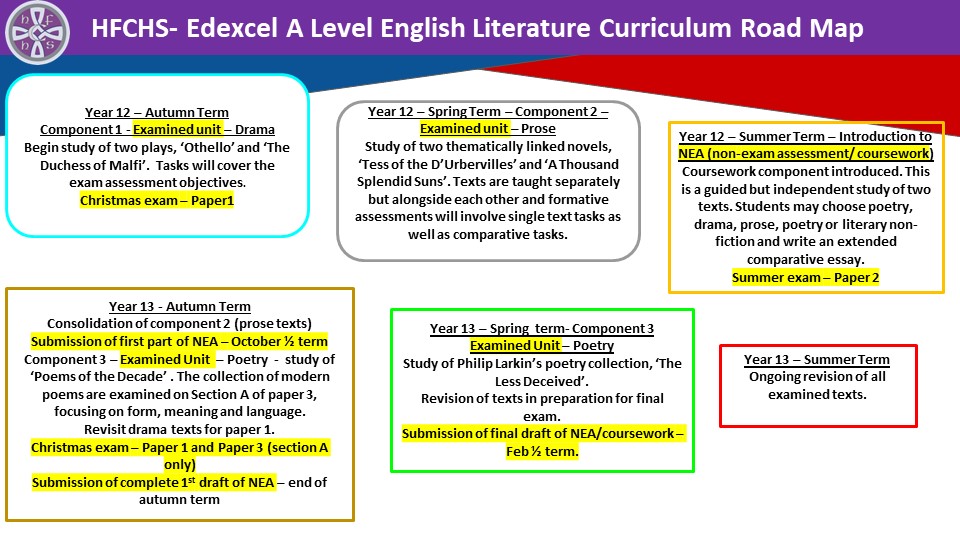
Edexcel A Level English Literature
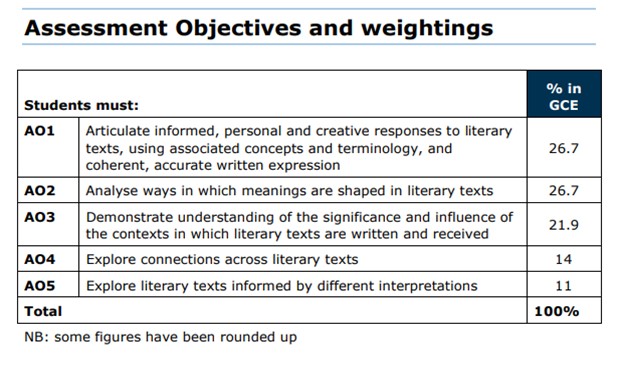
- AO1 Articulate informed, personal and creative responses to literary texts, using associated concepts and terminology, and coherent, accurate written expression
- AO2 Analyse ways in which meanings are shaped in literary texts
- AO3 Demonstrate understanding of the significance and influence of the contexts in which literary texts are written and received
- AO4 Explore connections across literary texts
- AO5 Explore literary texts informed by different interpretations
YEAR 12 TERM 1 COMPONENT 1 Drama
Overview
Students will study aspects of the form of drama via two plays. The central focus of the drama study is the literary text. Students will need to explore the use of literary and dramatic devices and the shaping of meanings in their chosen plays. Students study a tragedy by Shakespeare, ‘Othello’ and another tragedy, ‘The Duchess of Malfi’.
Teaching and wider reading should address the significance and influence of contextual factors and engage with different interpretations of the chosen Shakespeare play.
Students’ study of Shakespeare should be enhanced by engagement with critical writing. Teaching of this is supported by ‘Shakespeare: A Critical Anthology – Tragedy’
Learning outcomes
Students are required to:
● show knowledge and understanding of how playwrights use dramatic forms to shape meaning in drama texts and evoke responses in audiences
● show knowledge and understanding of the contexts in which texts have been produced and received and understanding of how these contexts influence meaning
● show knowledge and understanding of a range of ways to read and experience texts, responding critically and creatively
● respond to and evaluate texts, drawing on their understanding of interpretations by different readers such as literary critics
● identify and explore how attitudes and values are expressed in texts
● communicate fluently, accurately and effectively their knowledge, understanding and evaluation of texts
● use literary critical concepts and terminology with understanding and discrimination
● make appropriate use of the conventions of writing in literary studies, referring accurately and appropriately to texts and sources.
Critical writing
As part of their study of ‘Othello’, students should engage with different interpretations. To support this, students will be provided with the Shakespeare: A Critical Anthology: Tragedy. This anthology includes four generic essays and three specific essays on each set text to encourage students to engage with different readings of ‘Othello’.
Each anthology fulfils all of the requirements for engagement with different perspectives for this component. However, students will read also other essays or criticism on ‘Othello’ to supplement the critical anthologies.
|
Year 13 terminal assessment: |
|
● Written examination, lasting 2 hours 15 minutes. |
|
● Open book – clean copies of the drama texts can be taken into the |
|
examination. The Critical Anthology must not be taken into the examination. |
|
● Total of 60 marks available – 35 marks for Section A (Othello) and 25 marks for |
|
Section B (The Duchess of Malfi). |
|
● Two sections: students answer one question from a choice of two on their |
|
studied text for both Section A and Section B. |
|
● Section A – Shakespeare: one essay question, incorporating ideas from wider |
|
critical reading (AO1, AO2, AO3, AO5 assessed). |
|
● Section B – Other Drama: one essay question (AO1, AO2, AO3 assessed). |
|
30% of total qualification. |
YEAR 12 TERM 2 Component 2: Prose
Overview
Students will study aspects of prose via two thematically linked texts, ‘A Thousand Splendid Suns’ and ‘Tess of the D’Urbervilles’ (pre 1900 requirement). Literary study of both texts selected for this component, ‘Women and Society’ should incorporate the links and connections between them, and the contexts in which they were written and received.
Learning outcomes
Students are required to:
● show knowledge and understanding of how genre features and conventions
operate in prose fiction texts
● show knowledge and understanding of a range of ways to read texts, including
reading for detail of how writers use and adapt language, form and structure in
texts, responding critically and creatively
● show knowledge and understanding of a range of literary texts and make
connections and explore the relationships between texts
● show knowledge and understanding of the ways texts can be grouped and
compared to inform interpretation
● show knowledge and understanding of the contexts in which texts have been
produced and received and understanding of how these contexts influence
meaning
● identify and explore how attitudes and values are expressed in texts
● communicate fluently, accurately and effectively their knowledge, understanding
and evaluation of texts
● use literary critical concepts and terminology with understanding and
discrimination
● make appropriate use of the conventions of writing in literary studies, referring
accurately and appropriately to texts and sources
|
Year 13 terminal assessment |
|
● Written examination, lasting 1 hour and 15 minutes. |
|
● Open book – clean copies of the prose texts can be taken into the examination. |
|
● Total of 40 marks available. |
|
● Students answer one comparative essay question from a choice of two on their studied theme (AO1, AO2, AO3, AO4 assessed). |
|
20% of total qualification |
YEAR 12 TERM 3 – Coursework
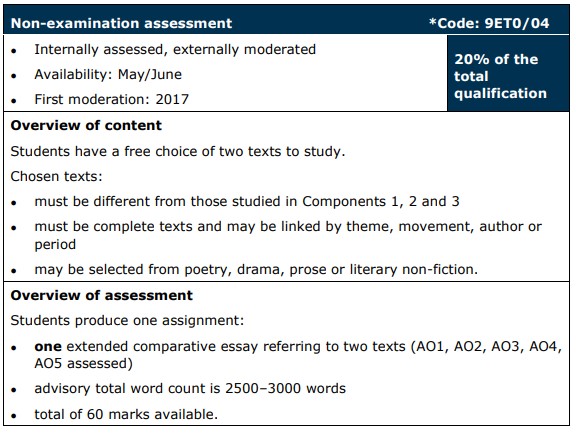
Non-examination assessment
Overview
Non-examination assessment will be assessed via two texts. There are no prescribed texts but students must choose complete texts which may be drawn from poetry, drama, prose or literary non-fiction. Students must select different texts from those studied in Components 1, 2 and 3.
The selected texts may be linked by theme, movement, author or period. Literary study of both texts should be enhanced by study of the links and connections between them, different interpretations and the contexts in which they were written and received.
Learning outcomes
Students are required to:
show knowledge and understanding of a variety of strategies for reading texts, including reading for detail of how writers use and adapt language, form and structure in texts
● show knowledge and understanding of ways to interpret and evaluate texts independently and in response to interpretations by different readers
● show knowledge and understanding of the contexts in which texts have been produced and received and understanding of how these contexts influence meaning
● show knowledge and understanding of a range of literary texts and make connections and explore the relationships between texts
● show knowledge and understanding of the ways texts can be grouped and linked to inform interpretation
● identify and explore how attitudes and values are expressed in texts
● communicate fluently, accurately and effectively their knowledge, understanding and evaluation of texts
● use literary critical concepts and terminology with understanding and discrimination
● make appropriate use of the conventions of writing in literary studies, referring accurately and appropriately to texts and sources
● make connections and explore the relationships between texts.
Content
Students will apply their literary reading skills to two chosen texts. They will engage in wider reading, use independent reading skills and apply research and study skills to their chosen literature. The choice of the two texts which should ideally reflect interests and preferences that have arisen as a result of the prescribed course and wider independent reading. Please note also that texts in translation are not allowed.
Tasks must enable students to explore the links and connections between their texts, different interpretations and the contexts in which they were written and received.
Y13 TERM 1-2 Component 3: Poetry
Overview
Students will study a selection of poems from two published poetry texts, ‘Poems of the Decade’ and Philip Larkin’s ‘The Less Deceived’.
In studying ‘Poems of the Decade’, they will consider the concerns and choices of modern-day poets in a selection of contemporary poems. Students will apply their knowledge of poetic form, content and meaning, and develop their skills in comparing an unseen poem with an example of studied poetry.
Students will also develop depth of knowledge about poetic style by studying a selection from the work of a single named poet, Philip Larkin.
Literary study of the chosen set poems should be enhanced by study of the contexts in which they were written and received.
Learning outcomes
Students are required to:
● show knowledge and understanding of the function of genre features and
conventions in poetry
● show knowledge and understanding of a range of ways to read texts, including
reading for detail of how writers use and adapt language, form and structure in
texts, responding critically and creatively
● show knowledge and understanding of a range of literary texts and make
connections and explore the relationships between texts
● show knowledge and understanding of the ways texts can be grouped and
compared to inform interpretation
● show knowledge and understanding of the contexts in which texts have been
produced and received and understanding of how these contexts influence
meaning
● communicate fluently, accurately and effectively their knowledge, understanding
and critical evaluation of texts
● identify and explore how attitudes and values are expressed in texts
● use literary critical concepts and terminology with understanding and
discrimination
● make appropriate use of the conventions of writing in literary studies referring
accurately and appropriately to texts and sources.
Unseen poetry
Students will be required to respond to an unseen poem in comparison with a studied poem from their contemporary text. Students are free to study the additional poems in the contemporary text, that have not been set for study, for unseen practice and wider reading.
|
Year 13 Terminal assessment |
|
● Written examination, lasting 2 hours and 15 minutes. |
|
● Open book – clean copies of the poetry texts can be taken into the examination. |
|
● Total of 60 marks available – 30 marks for Section A and 30 marks for |
|
Section B. |
|
● Two sections: students answer one question from a choice of two, comparing |
|
an unseen poem with a named poem from their studied contemporary text |
|
and one question from a choice of two on their studied movement/poet. |
|
● Section A – Post-2000 Specified Poetry: one comparative essay question on |
|
an unseen modern poem written post-2000 and one named poem from the |
|
studied contemporary text (AO1, AO2, AO4 assessed). |
|
● Section B – Specified Poetry Pre- or Post-1900: one essay question (AO1, |
|
AO2, AO3 assessed). |
|
30% of total qualification |
OCR Media Studies
This is a contemporary, accessible and creative course This specification will allow learners to study the media in an academic context and apply the knowledge and understanding gained to the process of creating their own media productions.
OCR’s A Level in Media Studies is designed to widen the intellectual horizons of the learner through the analysis of both global and historical media. The course fosters the development of critical and reflective thinking to encourage engagement in the critical debates surrounding contemporary media.
Students study nine media forms and associated set products using a theoretical framework covering media language, media representations, media industries and media audiences. They also consider the social, cultural, economic, political and historical contexts of media products.
Component 01: Media messages
Students study news and online, social and participatory media in depth and learn about how media language is used to construct representations and meaning in a variety of set media products.
There are two sections:
- In section A: News and online media, students carry out two linked in-depth studies that focus on contemporary news in the UK, requiring students to explore how and why newspapers and their online counterparts are evolving as media products and the relationship between both online and offline news.
- In section B: Media language and representation, students focus on media language and representation and consider how meanings are constructed across different media forms. This covers advertising and marketing, magazines and music videos.
Component 02: Evolving media
Students consider how media industries are evolving and using technology to reach, target and address audiences through a variety of set media products. Students also consider the media language, representations and messages and values communicated by long-form television drama and how these dramas are produced and consumed globally.
There are two sections:
- In section A: Media industries and audiences, students will explore media industries through film, video games and radio and audiences through video games and radio.
- In section B: Long-form television drama, students carry out an in-depth study focusing on contemporary long form television dramas, one English language and one European (non-English language).
Component 03/04: Creating media
Students create a cross-media product for an intended audience in response to a set brief. This gives them the opportunity to work independently and develop expertise built from their study in components 01 and 02.
Enrichment
At Key Stage 3 GCSE level, a programme of targeted intervention supports pupils’ progress and ensures particular aspects of reading and writing are addressed appropriately for the individual student
The students have the opportunity to develop as independent readers. Reading for pleasure is actively encouraged through small group reading sessions in our reading room, where young people explore a novel in a group of around five. This approach provides an opportunity to discuss a text with others, communicating their own ideas and learning from the knowledge and ideas of other students in the group. Another advantage is that students explore the text together and can therefore support each other. This helps to take some of the stress out of reading and can build confidence, increasing a student's motivation to read.
We provide lunchtime reading clubs and the reading room is also available as a quiet, supervised space, where pupils can go to read in a relaxing atmosphere away from the hustle and bustle of the playground.
Trips and visits form an important part of the enrichment programme. For example: author presentations and writing workshops; theatre visits to local theatres and further afield, including the West Yorkshire Playhouse and Stratford-Upon-Avon; cinema visits to watch National Theatre Live and RSC performances, allowing students to access plays that would be otherwise unavailable to them; a visit to Warner Bros. Harry Potter Studio Tour.
Resources
In addition to specific websites and resources to which children will have access upon the advice and guidance of their teachers, the following websites provide useful and engaging support materials;
- www.lovereading4kids.co.uk
- www.booktrust.org.uk
- www.gcsepod.com
- www.bbc.co.uk/bitesize
- www.massolit.io (KS4 and 5 Literature)
- www.bl.uk (British Library, KS4 and 5 Literature)
- https://qualifications.pearson.com/en/subjects/english.html
Careers
Links
https://careerpilot.org.uk/job-sectors/subject/english
https://successatschool.org/careerzones
Link for English-related work experience opportunities
Work Experience – Speakers for Schools
For further information on careers involving English, visit https://www.prospects.ac.uk/
Some possible careers include
- Advertising copywriter
- Archivist
- Arts Administrator
- Editorial assistant
- English as a foreign language teacher
- Lexicographer
- Librarian
- Magazine journalist
- Marketing executive
- Media researcher
- Newspaper journalist
- Publishing copy-editor/proofreader
- Public relations officer
- Records manager
Related News
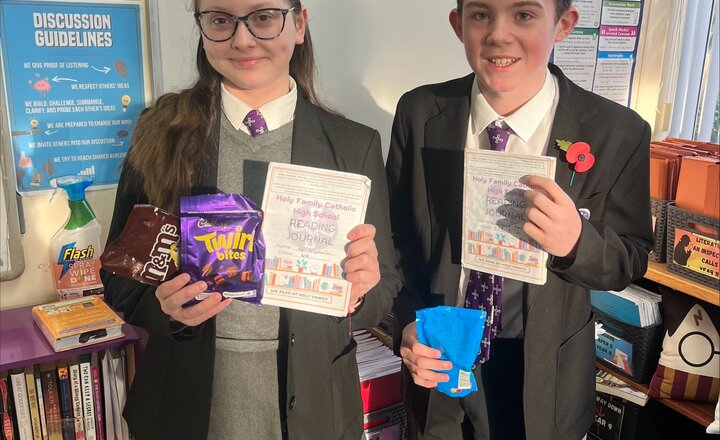
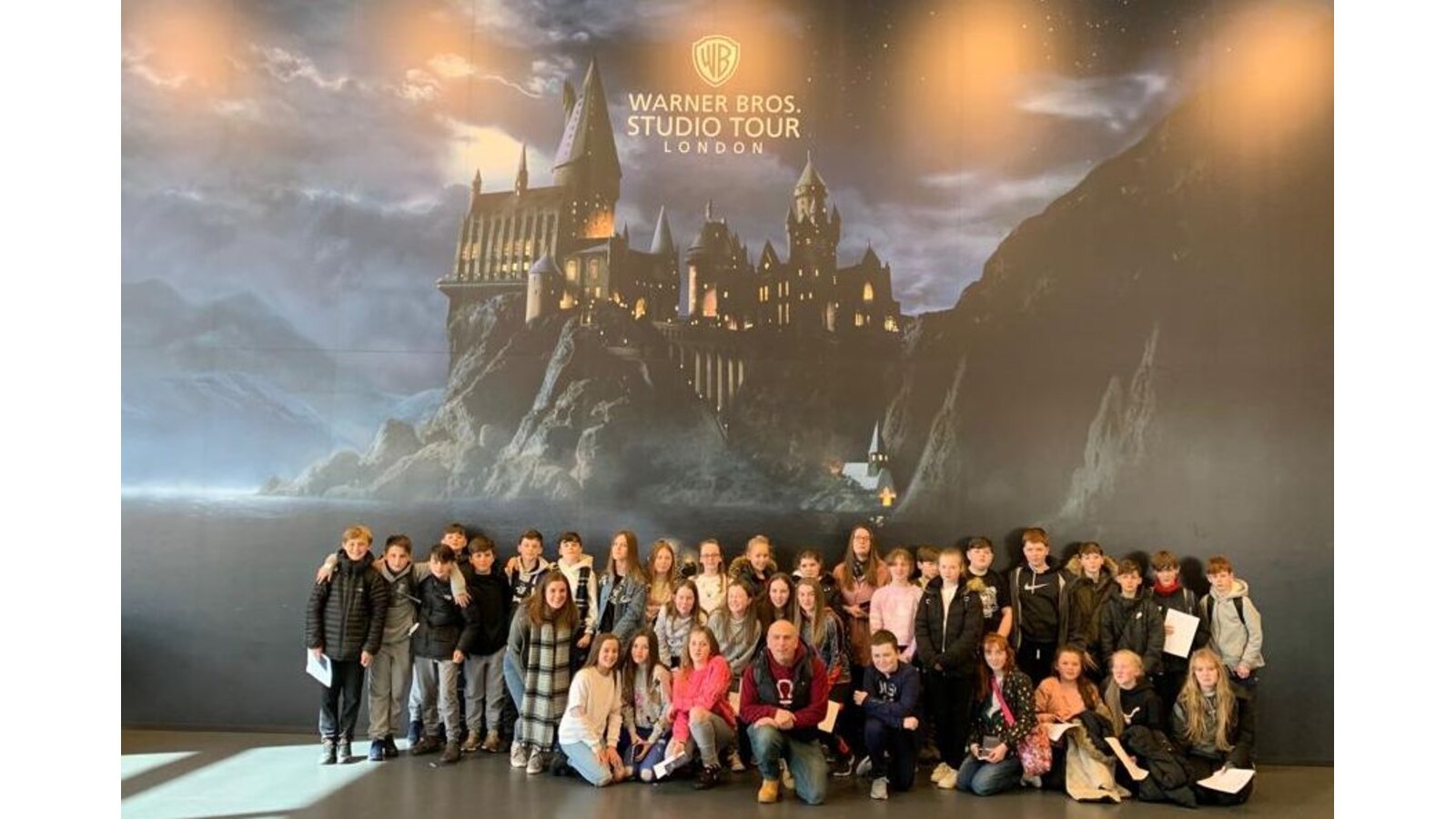
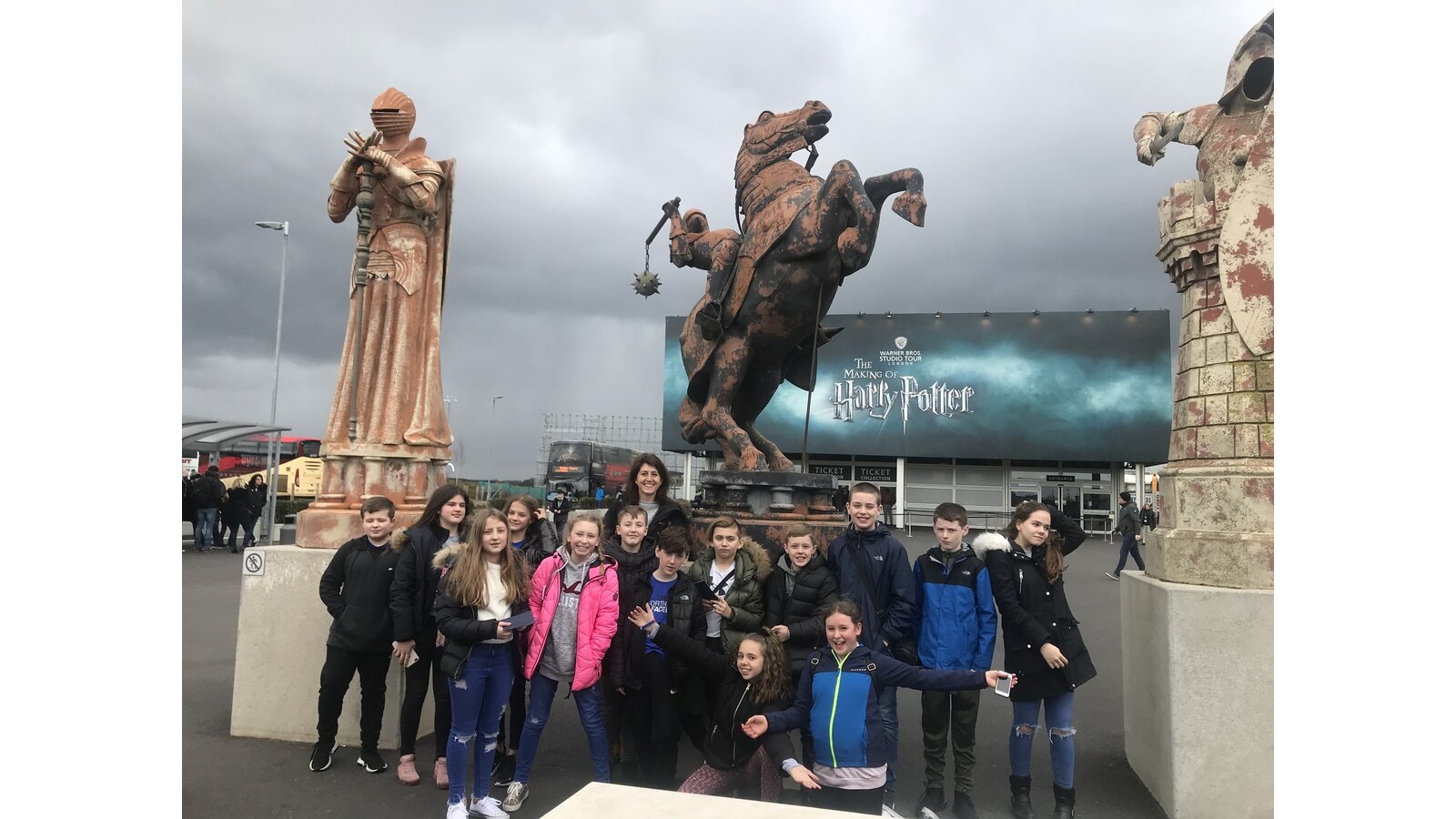
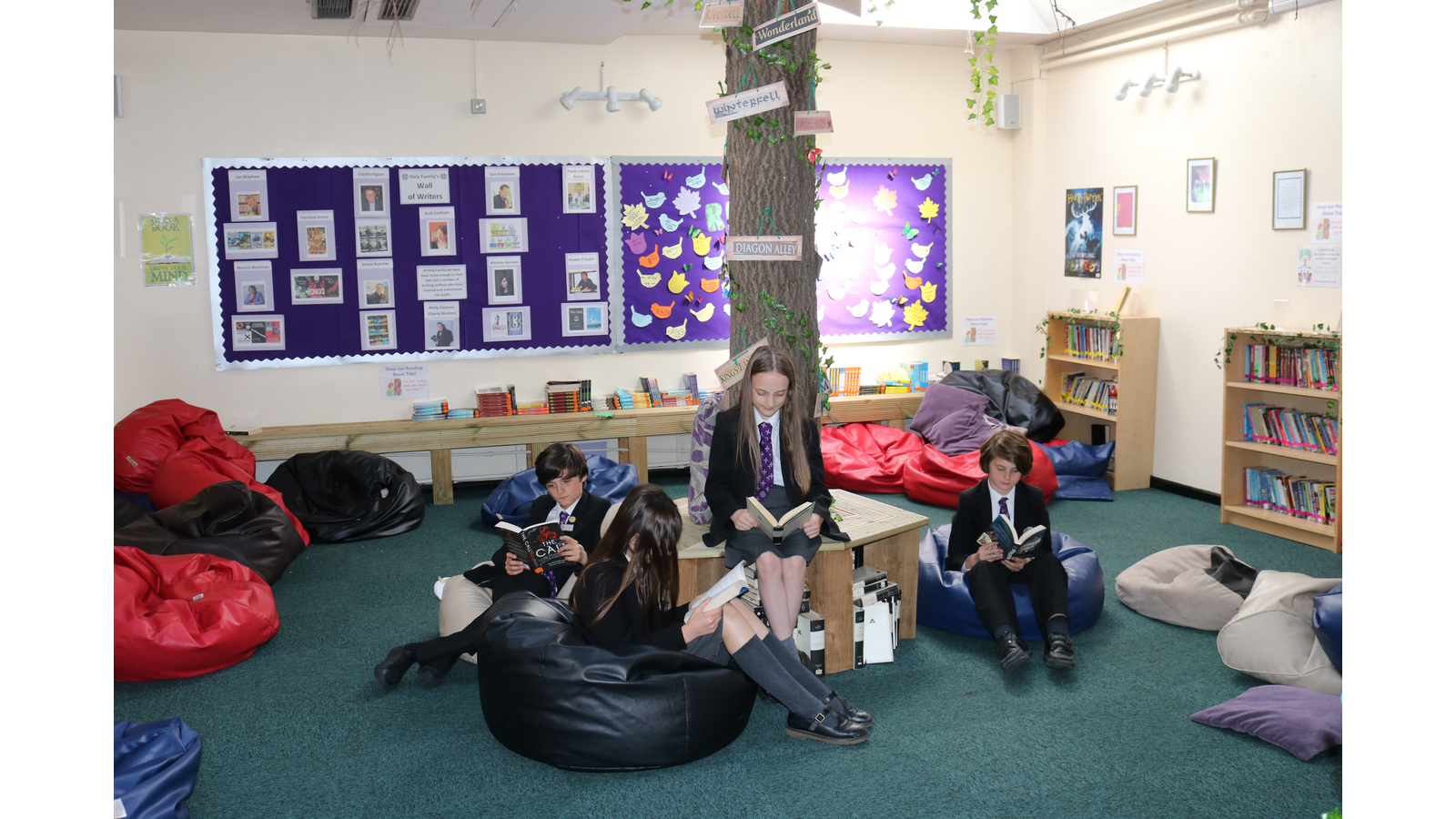
.jpg)

